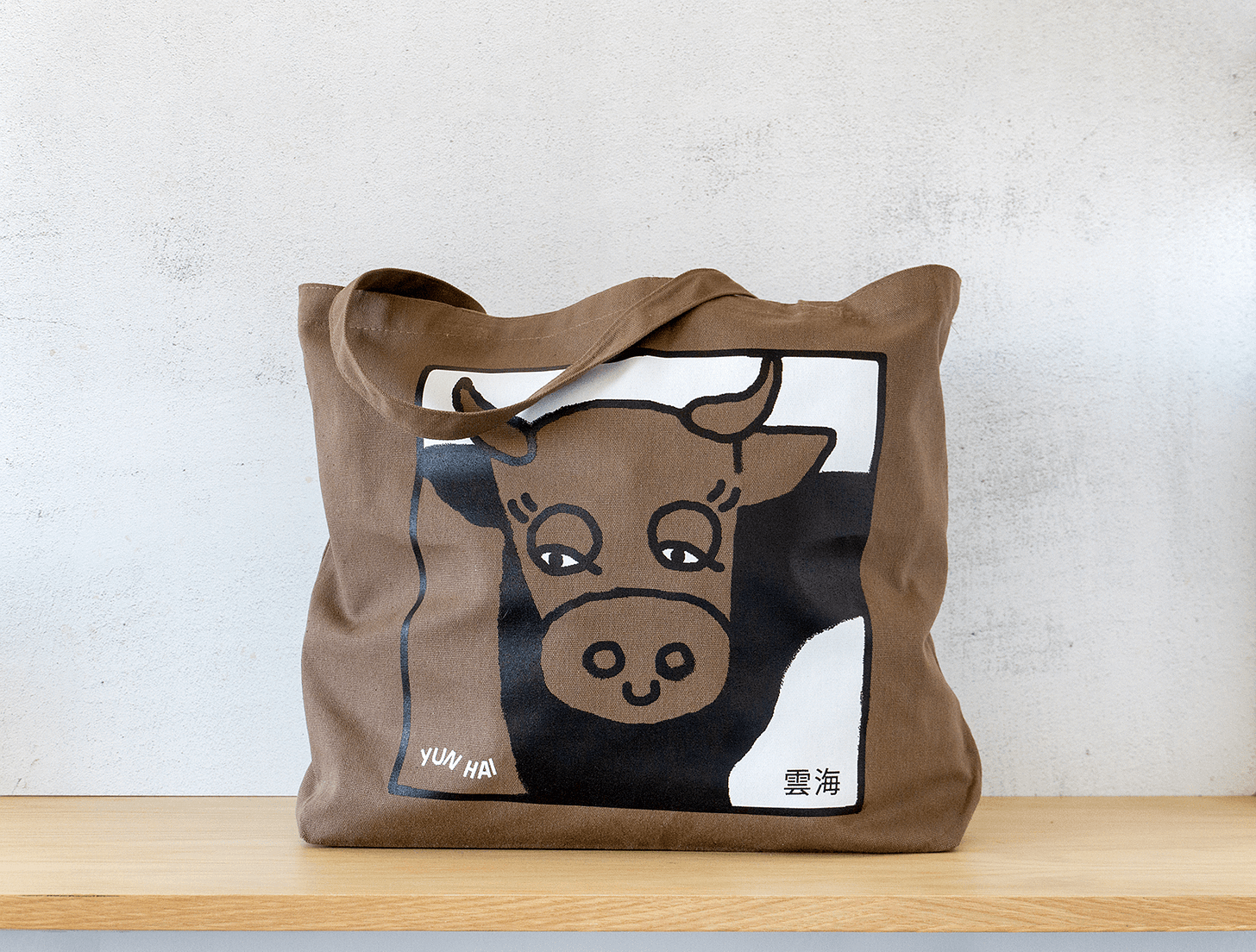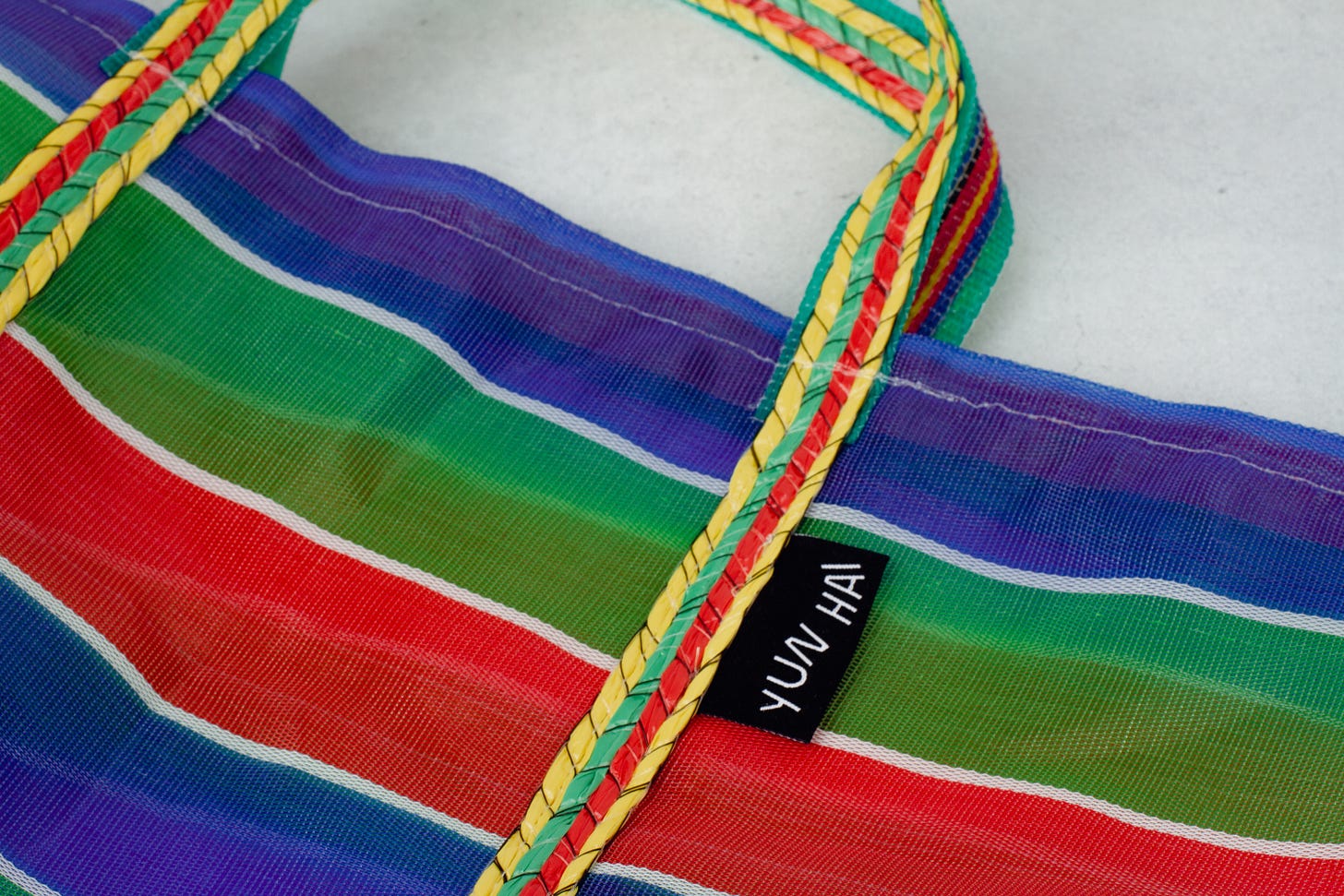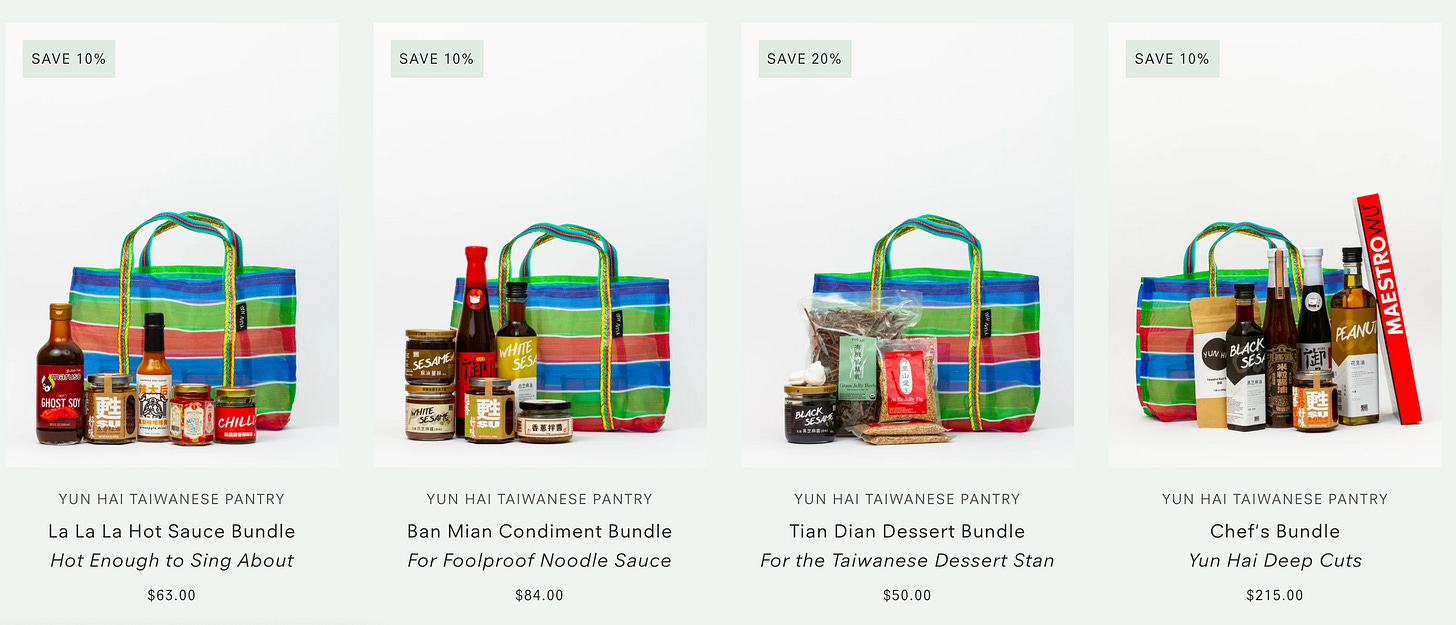感謝: A Note of Thanks and the Yun Hai Year in Review
plus 15% Off, Ga Ji Dai Gift Bundles, and a Dong Po Pork Belly Recipe
This is Yun Hai Taiwan Stories, a newsletter about Taiwanese food culture by Lisa Cheng Smith 鄭衍莉, founder of Yun Hai Taiwanese Pantry. If you aren’t yet a subscriber, sign up here.
Today, I’m looking forward to a restful holiday after a breakneck pace of product launches (I haven’t even had a chance to update you on our Taiwanese Dried Fruit, new Su Chili Crisp Flavors, or the Maestro Wu Cleavers). I want to thank you for giving Yun Hai the momentum, energy and affirmation that keeps this business booming. Please use discount code GANXIE15 for 15% off any orders $60 and up between now and November 29th.
Yun Hai Year In Review
We’ve accomplished so much in 2021, and it’s not over yet! It’s been pedal to the metal all year, launching products, onboarding team members, telling product stories, chatting with customers, and in general growing, growing, growing. Here’s a summary of all we’ve done in 2021 so far:
In February, I left my job to focus on Yun Hai full time after running it as a side biz for several years. Auspiciously, my last day was Chinese New Year 2021. Lucky Ox.

Remember this cute Year of the Ox Tote we made? Did I ever tell you my husband drew it? Yeah, he’s good. Still a few left actually. Our COO Lillian Lin joined me as a partner in March. She comes from a background of food sourcing and restaurant operations and grew up in Taiwan. We may be divided on our opinion of cilantro and very spicy food (I’ll take ‘em), but we have the same passion for sharing Taiwan’s food and culture with the world. She’s amazing, and I’m so lucky to be working with her. Hi, Lillian!
In April, we premiered a mini documentary called Time, Terroir, Taiwan: Soy Sauce Brewing in XiLuo, that follows the third generation soy sauce brewers we work with throughout their fermentation process. We collaborated with Taiwanese American filmmaker Chen Office to produce this beautiful piece. Watch it here.
In April and May, we ran a Kickstarter that raised $113,000 dollars to buy over 14 tons of fruit from independent Taiwanese farmers that are vulnerable to China-Taiwan trade volatility, specifically the Pineapple Ban enacted by China in March and the Wax Apple ban that followed in September. You helped us do this by spreading the word to your friends and family, to great effect. We launched our dried fruits last month, and business was so strong I haven’t yet had time to announce it here. If you haven’t seen them yet, check them out here. (If this is your first time hearing about the project, visit our Kickstarter page here).
This summer, we brought on Jonathan Wang as Wholesale/Retail Lead and Cat Yeh as Marketing Manager. Thank you for sharing your talent, expertise, pork belly, and knife skills with us! We could not do this without you.
Between August and November, we doubled our catalog and launched cold pressed oils (sesame, peanut and camellia) and sesame pastes, wild grown Ai Yu Jelly Fig Seeds, Organic Grass Jelly (Mesona) Herb, Empress Hot Sauce, Shangi Plum Powder, a bunch of dried fruit, two new flavors of Su Chili Crisp (with new packaging by Taiwanese design studio o.oo), and hand forged Maestro Wu knives made from scavenged artillery steel.
We’ve almost quadrupled our 2020 sales and we’ve got six weeks to go. This means many more cool things to come in 2022!
Thanks again for helping us grow and for all the words of encouragement and advice you’ve offered throughout the year. Here’s a thank you discount code for being a friend of Yun Hai, for your use only.
Please use discount code GANXIE15 for 15% off any orders $60 and up between now and November 29th.
Ga Ji Dai Gift Bundles
This Taiwanese Market Bag (茄芷袋 Bag) is a quintessential daily use item in Taiwan. You'll see these everywhere when walking the old streets in Taiwan; they were (and still are) traditionally used as grocery and bulk produce totes, an OG reusable shopping bag.
The bag style originated in the Japanese era and was originally hand crafted from rushes. As manufacturing technology was developed, the original bags were reinterpreted using a red, white, green, and blue pinstripe nylon fabric, similar in feel and construction to fishing nets. The material is perfect for agricultural, rural, and market use—it's hard wearing and can simply be rinsed in water and air dried. The largest sizes are widely used in traditional agriculture to hold bulk quantities of tea and vegetables for transport.
Ga Ji Dai is a phoneticization of the original Japanese name, referencing the grass weaving technique used to make them. The Chinese characters translate to eggplant, but are only used because they approximate the sound of the colloquial name.
This year, we put together limited edition gift bundles featuring our Ga Ji Dai and a selection of products designed to satisfy every kind of food freak. These sets are discounted up to 20% from their retail value. Combined with the newsletter discount code and free shipping over $100+, they’re a really, really good deal. I know many of you use our products daily, so I hope this helps you stay stocked up for less.
Recipe: Dong Po Braised Pork Belly
In early November, I invited the whole team to my home for a photo shoot, product tasting, and a little pre-holiday cheer. Cat brought over this Dong Po Braised Pork Belly, made with a combo of our Amber River and Firewood Soy Sauce. Absolutely delicious; there’s nothing that warms from the inside out like a melty soy-braised pork.
Here’s the recipe from Cat. Make it sometime between Thanksgiving and the end of the year to cloak your spirit in comfort and collagen.

Ingredients
2 lb pork belly
2 and a half bunches of scallion
10 slices of ginger
2-1/2 cups Shaoxing wine
2/3 cup Yu Ding Xing Amber River Soy Sauce
1/3 cup Yu Ding Xing Firewood Soy Sauce
4 oz. rock sugar
5 pieces star anise
2 whole long red chili peppers (preferably fresh, but dried works too)
Directions
Rinse the pork belly of any bone bits or sediment and blanch whole in boiling water for 5 minutes.
Drain and cut the pork belly into same size pieces. Either 3x3 inches or 2x2 inches should work, depending on the shape of the original cut of meat. Be sure you slice it so you get layers of fat, meat and skin in each piece, like layers in the Grand Canyon.
Wash scallions and keep whole with ends on. Lay evenly across the bottom of a braising pot (or any similar heavy bottom medium pot).
Wash ginger of any dirt and slice into 10 thin pieces.
Lay the ginger evenly on top of the scallion.
Next lay the pork belly skin side down on top of the ginger and scallions.
Pour over the Shaoxing wine, both soy sauces, rock sugar, star anise, and chilis (sliced open down the middle if fresh, kept whole if dried).
Cover the pot and bring to a boil. Once boiling, turn the heat low and let it simmer, lid on, for 90 minutes. Do not stir.
After 90 minutes, turn the pork belly skin-side up. Cover and let simmer for another 90 minutes..
Once finished plate the pork belly and drizzle the sauce over the pork

Not turkey, but still a sedative. Zzzzzz.
And on that note, here’s wishing you a warm, cozy, and restful holiday,
Lisa Cheng Smith 鄭衍莉
If you enjoyed this newsletter, please share it with friends and subscribe if you haven’t already. We email once a month, sometimes more. For more Taiwanese food, head to yunhai.shop, follow us on instagram and twitter, or view the newsletter archives. If you’d like to see a topic covered or have a burning question that needs an answer, please leave us a comment.











